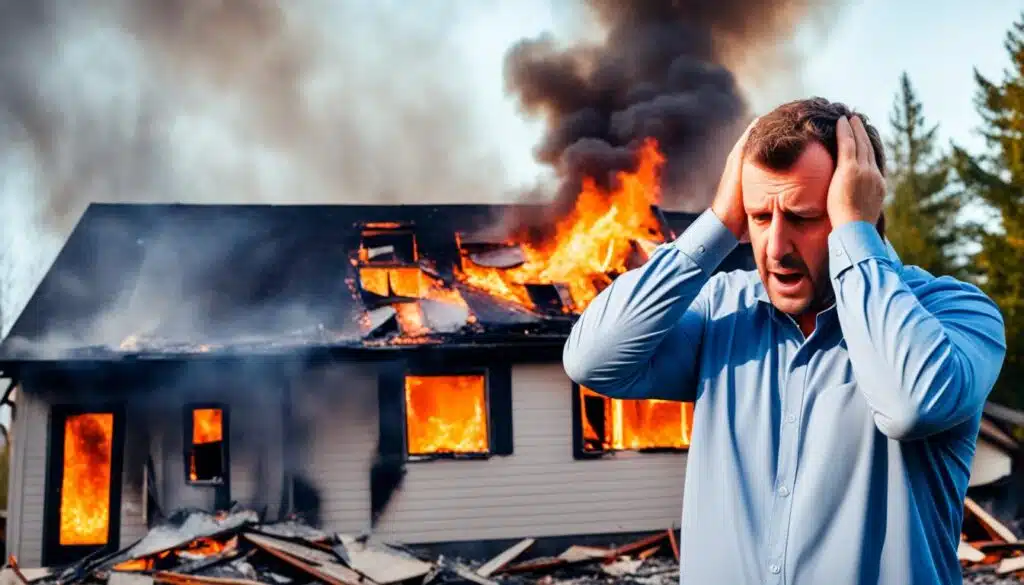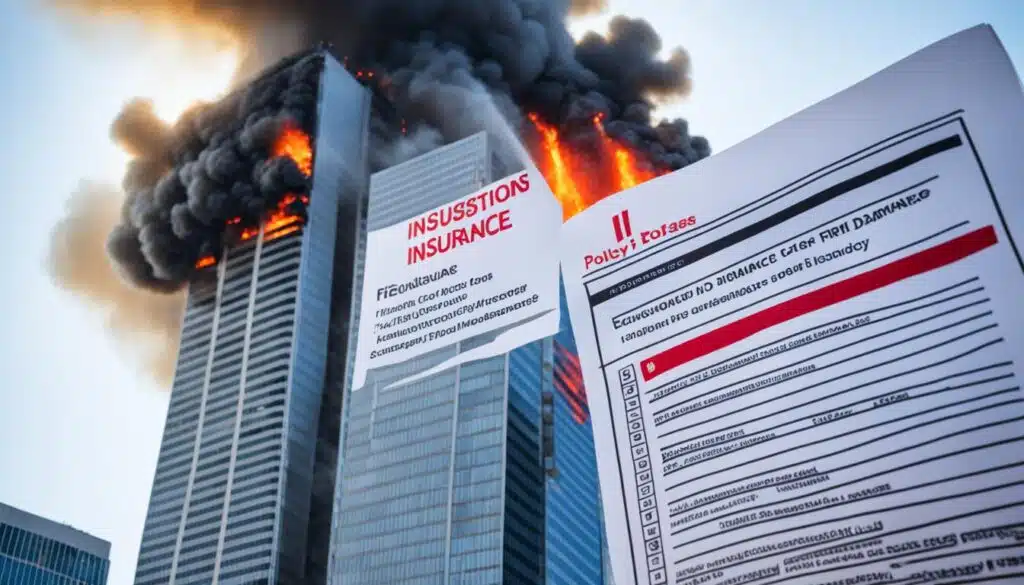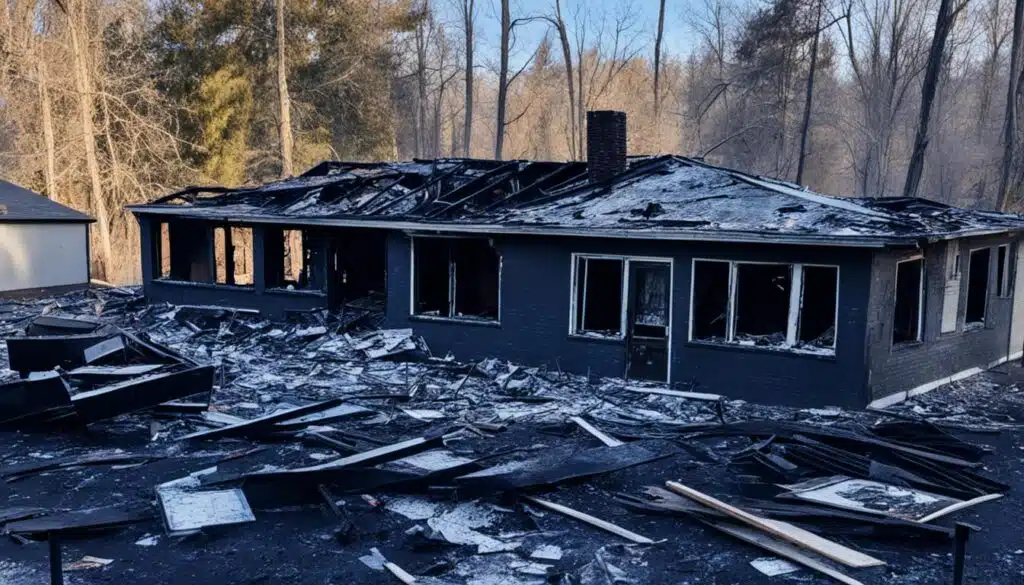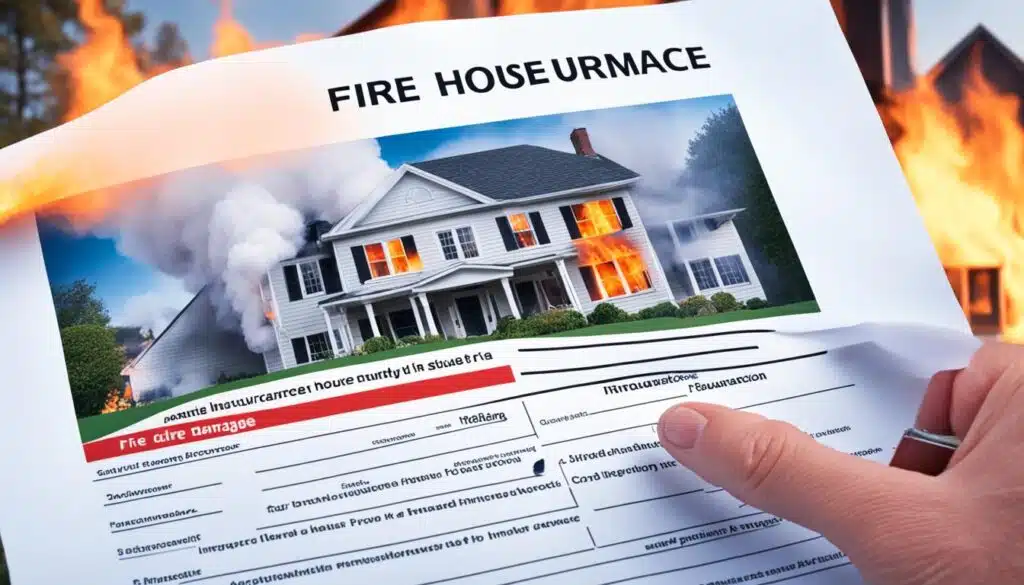Fire Damage Insurance For Your Property is an essential component of property insurance that provides financial protection against fire-related damages to your property. It is crucial for homeowners to have adequate homeowners insurance with fire damage coverage to protect their homes and personal property. Additionally, liability coverage is important to cover legal claims and settlements in the event of a fire. It’s essential to understand the coverage limits and exclusions of your policy to ensure you have sufficient protection.
When unexpected disasters strike, such as fire, your property and possessions can be destroyed or severely damaged. Having fire damage insurance can provide you with the necessary financial support to rebuild and recover. It’s important to protect your home from the devastating effects of fire and ensure you have the right insurance coverage in place.
Fire damage insurance, also known as property insurance, not only covers the physical damage caused by fire but also provides liability coverage in case someone gets injured on your property due to a fire-related incident. This coverage offers financial protection and ensures that you are not held personally responsible for any legal claims or settlements arising from the fire.
While homeowners insurance typically includes fire damage coverage, it’s essential to review your policy to understand the specific coverage limits and any exclusions that may exist. This will help you determine if you have adequate protection in place and if there are any additional coverages you may need to consider.
Protecting your home and your assets should be a top priority. Fire damage insurance provides the peace of mind and financial security you need to face unforeseen disasters confidently.
Key Takeaways:
- Fire damage insurance is a crucial component of property insurance to protect your home and personal property from fire-related damages.
- Liability coverage is important to cover legal claims and settlements in the event of a fire.
- Understanding the coverage limits and exclusions of your policy is essential to ensure sufficient protection.
- Fire damage insurance provides financial support to rebuild and recover after a fire.
- Review your policy to ensure you have adequate protection and consider additional coverages if needed.
Understanding Fire Damage Legal Liability Coverage
When it comes to protecting yourself as a tenant or a business owner, fire damage legal liability coverage is an important aspect of your insurance policy. This coverage provides financial protection against liability for fire-related damages to rented premises. It is typically included as part of a commercial general liability policy, ensuring that you are prepared for the unexpected.
In the unfortunate event of a fire, tenants may be held legally responsible for causing the fire, which can result in expensive settlements and legal claims from the landlord. Fire damage legal liability coverage offers the necessary financial protection, giving you peace of mind and safeguarding your financial stability.
With fire damage legal liability coverage, you can rest assured that you are covered for damages caused by fire incidents that occur on the rented premises. This coverage extends to property damage, injuries, or loss of life resulting from a fire.
By having this coverage in place, tenants and business owners can mitigate the financial risks associated with fire incidents and focus on recovery. Whether it’s repairing the property or compensating for damages, fire damage legal liability coverage provides the necessary financial resources to handle any legal challenges that may arise.
It is important to note that this coverage is specific to fire damage and does not cover other types of damages. Therefore, it is crucial to review your insurance policy to fully understand the scope and limitations of your coverage.
To illustrate the importance of fire damage legal liability coverage, here is a breakdown of a typical commercial general liability policy:
| Coverage | Description |
|---|---|
| Fire Damage Legal Liability | Provides coverage for fire-related damages to the rented premises, including property damage, injuries, or loss of life resulting from a fire. |
| General Liability | Covers a broad range of liability risks, such as bodily injury, property damage, personal injury, and advertising injury. |
| Products and Completed Operations Liability | Protects against liability claims arising from products sold or work completed by the insured. |
| Medical Payments | Covers medical expenses for injuries sustained on the rented premises, regardless of fault. |
| Advertising Injury | Protects against claims of false advertising, libel, slander, and copyright infringement. |
Table: Breakdown of a Commercial General Liability Policy
Understanding fire damage legal liability coverage and its inclusion in your commercial general liability policy is essential for tenants and business owners. This coverage provides the financial protection you need to navigate potential legal claims and settlements, ensuring that you are adequately protected and can focus on running your business.
The Importance of Comprehensive Coverage
Fires can cause devastating property damage, including structural damage and loss of valuable possessions. Without comprehensive coverage, the financial burden of repairing or replacing damaged property can be overwhelming. It’s important to ensure that your property is adequately insured to avoid financial instability.
Comprehensive coverage provides a wide range of protection against various risks and perils, including fire damage. This type of coverage goes beyond basic property insurance policies, offering additional safeguards for your property and belongings. In the event of a fire, comprehensive coverage can help cover the costs of repairing or rebuilding your property, replacing damaged items, and even providing temporary living arrangements if necessary.
Having comprehensive coverage offers financial stability and peace of mind, knowing that you are adequately protected against the potential losses caused by a fire. Whether you own a home, a rental property, or a business, comprehensive coverage can help mitigate the financial impact of fire damage, ensuring that you can recover and rebuild without enduring significant financial setbacks.
Moreover, property owners should be aware of the risks of being underinsured. Underinsured property can leave you vulnerable to substantial out-of-pocket expenses in the event of a fire. Without sufficient coverage, you may be responsible for covering the remaining costs of repairing or rebuilding your property and replacing your belongings. By maintaining comprehensive coverage, you can safeguard against the potential financial hardships associated with being underinsured.
While having comprehensive coverage is important, it’s equally crucial to take proactive fire prevention measures to reduce the risk of fire-related incidents. Implementing fire prevention practices such as installing smoke detectors, fire extinguishers, and sprinkler systems can significantly reduce the likelihood and severity of fires. Regularly inspecting and maintaining electrical systems, addressing potential fire hazards, and educating yourself and your family about fire safety protocols are also essential steps in fire prevention.
By combining comprehensive coverage with effective fire prevention measures, you can better protect your property, belongings, and loved ones from the devastating effects of a fire. Investing in fire insurance and prioritizing fire safety measures demonstrates a commitment to safeguarding your assets and ensuring a more secure future.

Image: Comprehensive coverage provides financial protection against property damage caused by fire.
The Role of Fire Legal Liability Insurance
When it comes to fire damage insurance, it’s not just about covering property damages. Fire legal liability insurance plays a crucial role in protecting policyholders from the legal challenges that can arise from fire-related incidents. This coverage goes beyond financial compensation for property damages and includes provisions for legal defense costs.
Legal proceedings can be complex and expensive, but with a robust fire legal liability policy, policyholders can navigate the legal system effectively without compromising their financial resources. This coverage provides a safety net, ensuring that policyholders have the necessary financial support to handle legal challenges.
In the event of a fire-related incident, policyholders may face potential legal claims and lawsuits. This is where fire legal liability insurance steps in, offering financial resources to cover legal defense costs. Policyholders can have peace of mind knowing that their insurance company will handle the expenses associated with legal proceedings.
Whether it’s defending a liability claim or filing an insurance claim against a responsible party, fire legal liability insurance provides the necessary financial resources to support policyholders throughout the legal process.
Having fire legal liability insurance in place not only protects policyholders from the financial burden of legal defense costs, but it also ensures that they can effectively pursue their rights and seek appropriate compensation for damages.
Fire legal liability insurance serves as a valuable asset in safeguarding both the financial well-being and the legal interests of policyholders. It offers a layer of protection that extends beyond property damages and provides the necessary resources to handle any legal challenges that might arise from fire-related incidents.
By investing in fire legal liability insurance, policyholders can have confidence in their ability to navigate the legal complexities that can accompany such emergencies, focusing on repairing and restoring their property while leaving the legal matters in capable hands.
Fire Legal Liability Insurance Coverage Benefits
| Benefits of Fire Legal Liability Insurance |
|---|
| Covers legal defense costs |
| Provides financial resources for legal proceedings |
| Ensures policyholders can effectively pursue their rights |
| Offers peace of mind during legal challenges |

Fire legal liability insurance plays a crucial role in protecting policyholders from the legal challenges that can arise in the aftermath of a fire-related incident. By providing coverage for legal defense costs and offering financial resources for legal proceedings, this insurance ensures that policyholders can navigate the legal system effectively without compromising their financial resources. With fire legal liability insurance in place, policyholders can have peace of mind knowing that they have the necessary support to handle any legal challenges that may arise.
Factors Affecting Fire Damage Insurance Premiums
Understanding the factors that influence fire damage insurance premiums can help policyholders estimate the cost of their coverage. Insurance companies consider various factors to assess the level of risk associated with insuring a property or individual.
The key factors that can impact premiums include:
- Risk Assessment: Insurance companies evaluate the level of risk associated with insuring a specific property or individual. This assessment takes into account factors such as the property’s location and proximity to high-risk fire areas.
- Property Type: The type of property being insured can influence insurance premiums. Different property types may have varying levels of fire risk, which insurance companies take into consideration when determining premiums.
- Fire Safety Measures: The presence of fire safety measures can help reduce the risk of fire-related incidents. Properties equipped with smoke detectors, fire extinguishers, and sprinkler systems may qualify for lower premiums as these safety measures mitigate the severity of potential damages.
- Claims History: Insurance companies also consider the claims history of the policyholder. A history of frequent claims or high-value claims may result in higher premiums, as it indicates a higher risk profile.
| Factors | Impact on Premiums |
|---|---|
| Risk Assessment | Influence based on the property’s location and proximity to high-risk fire areas. |
| Property Type | Varies based on the type of property being insured and its associated fire risk. |
| Fire Safety Measures | Presence of safety measures (e.g., smoke detectors, fire extinguishers) can lead to lower premiums. |
| Claims History | Frequent or high-value claims may result in higher premiums. |
Understanding these factors allows policyholders to assess the cost of their fire damage insurance coverage accurately. By managing risk through the implementation of fire safety measures and maintaining a favorable claims history, individuals can potentially reduce their premiums and secure adequate financial protection.
Quote:
“By implementing fire safety measures and maintaining a favorable claims history, policyholders can not only reduce their fire damage insurance premiums but also ensure they have the necessary financial protection in the event of a fire-related incident.” – [Name of Expert or Source]
Coverage Limits and Policy Exclusions
When it comes to fire damage insurance, understanding the coverage limits and policy exclusions is crucial. Coverage limits determine the maximum amount that your insurance company will pay to cover fire-related damages. It’s important to assess the value of your assets and potential liabilities before selecting the appropriate coverage limits. This ensures that you have adequate coverage to protect your property and belongings in the event of a fire.

Policy exclusions, on the other hand, outline the circumstances or events that are not covered by your insurance policy. It’s essential to review these exclusions carefully to avoid any surprises when filing a claim. Common exclusions in fire damage insurance policies include damages resulting from intentional acts, criminal activities, and negligence.
Understanding policy exclusions helps you avoid inadequate coverage and ensures that you have the protection you need in the event of a fire. It’s important to take the time to read and comprehend your insurance policy thoroughly to prevent disputes and financial hardships.
| Factors to Consider | Coverage Limits | Policy Exclusions |
|---|---|---|
| Assessing the value of assets and potential liabilities | Determining the maximum amount for fire-related damages | Understanding circumstances not covered by the policy |
| Reviewing insurance policies carefully | Preventing inadequate coverage | Avoiding surprises when filing a claim |
| Avoiding intentional acts, criminal activities, and negligence | Ensuring appropriate coverage | Preventing disputes and financial hardships |
Proving Negligence in Fire Damage Claims
Proving negligence is a crucial aspect of fire damage claims. Negligence refers to the failure to exercise reasonable care, resulting in harm or damage to others. In the context of fire damage, negligence can involve actions such as leaving flammable materials near heat sources or neglecting proper fire safety precautions.
Both the claimant and the defendant have the responsibility of proving their case in a fire damage claim. The claimant must demonstrate that the defendant’s actions or inactions directly led to the fire and subsequent damages. On the other hand, the defendant must prove that they acted responsibly and took reasonable precautions to prevent the fire.
“Negligence is the failure to exercise the level of care that a reasonable person would in similar circumstances. It is crucial in fire damage claims to establish whether negligence contributed to the occurrence of the fire and subsequent damages.”
When proving negligence in a fire damage claim, it is essential to gather evidence that supports your case. This evidence may include witness statements, expert opinions, documentation of fire safety measures, and any relevant photographs or videos. Additionally, it is crucial to work with experienced legal professionals who can guide you through the complex legal process and help strengthen your claim.
Gathering Evidence in Fire Damage Claims
When building a case to prove negligence in fire damage claims, collecting the following evidence can be beneficial:
- Witness statements from individuals who may have observed the defendant’s actions or noticed any fire safety hazards
- Expert opinions from professionals such as fire investigators or safety inspectors
- Documentation or photos of fire safety measures in place at the time of the incident
- Records regarding any previous fire-related incidents or complaints involving the defendant

An Example of Negligence in Fire Damage Claims
To further illustrate the concept of negligence in fire damage claims, consider the example below:
| Scenario | Potential Negligence |
|---|---|
| A fire breaks out in a commercial building. | The owner of the building failed to install functioning smoke detectors, despite local building codes requiring them. |
| A residential fire occurs due to faulty electrical wiring. | The electrician who installed the wiring did not follow standard safety protocols and failed to identify potential hazards. |
In both scenarios, negligence can be demonstrated by showing that the responsible parties failed to take reasonable steps to prevent the fire or address known risks.
Proving negligence is a critical element in fire damage claims. By gathering compelling evidence and working with experienced legal professionals, claimants can strengthen their case and seek the compensation they deserve.
The Cost of Fire Damage Insurance
The cost of fire damage insurance is determined by various factors, including the location, type, and value of the property being insured. Insurance companies conduct a risk assessment to evaluate the likelihood of fire-related incidents and adjust premiums accordingly, ensuring that policyholders have adequate coverage. Additionally, installing fire sprinkler systems can lead to premium discounts due to their effectiveness in reducing the risk of fire damage. Policyholders should consider their coverage needs and explore options to mitigate insurance costs while still maintaining sufficient protection.
The Factors Influencing Insurance Premiums
| Factors | Impact |
|---|---|
| Location | Determines the risk of fire incidents in the area. |
| Property Type | Certain properties may be more susceptible to fire damage. |
| Property Value | Higher-value properties may require greater coverage. |
| Coverage Needs | Policyholders with higher coverage needs may face higher premiums. |
| Fire Sprinkler Systems | Installing fire sprinkler systems can lead to premium discounts. |

Tips for Choosing and Managing Fire Damage Insurance
When it comes to protecting your property from fire damage, having the right insurance coverage is essential. Here are some valuable tips to help you choose and manage your fire damage insurance effectively:
1. Assess Your Needs
Start by assessing your specific insurance needs. Consider the value of your assets and the level of protection required to cover potential fire-related damages. This evaluation will help you determine the appropriate coverage limits for your policy.
2. Compare Options
Don’t settle for the first insurance company you come across. Take the time to compare multiple options. Look for insurance providers that specialize in fire damage coverage and compare the rates, coverage options, and additional benefits they offer.
3. Determine Coverage Level
Decide on the coverage level that suits your needs. It’s important to strike a balance between affordability and adequate protection. Consider factors such as the replacement cost of your property and belongings when determining the coverage level.
4. Consider Additional Coverages
While fire damage coverage is essential, you may also need additional coverages to safeguard your assets fully. Consider options such as jewelry insurance or flood coverage, depending on the specific risks associated with your property.
5. Maintain Record Management
Keep detailed records of your belongings and property. This will help streamline the claims process and ensure accurate reimbursement in case of fire-related damages. Maintain an up-to-date inventory and store important documents in a safe location, such as a fireproof safe or digital cloud storage.
6. Regularly Review and Update
Periodically review your fire damage insurance policy to ensure it aligns with your current needs. As your circumstances change, such as acquiring new assets or making renovations, update your policy accordingly. Regularly reviewing and updating your policy ensures you have the most appropriate coverage in place.
Remember, fire damage insurance is not something you set and forget. It requires active management and periodic reassessment to ensure your assets remain adequately protected.
By following these tips, you can choose the right fire damage insurance policy and effectively manage it to provide peace of mind and financial security.
| Tips for Choosing and Managing Fire Damage Insurance |
|---|
| Assess Your Needs |
| Compare Options |
| Determine Coverage Level |
| Consider Additional Coverages |
| Maintain Record Management |
| Regularly Review and Update |
The Benefits of Fire Insurance Coverage
Fire insurance coverage provides peace of mind and financial protection against losses caused by fire-related incidents. In the unfortunate event of a fire, having adequate coverage ensures that your property can be restored and repaired without bearing the financial burden alone. Insurance companies provide support throughout the insurance claim process, offering dedicated support to policyholders.
When a fire strikes, the emotional toll can be overwhelming. However, with fire insurance coverage, you can have peace of mind knowing that your home, personal belongings, and assets are financially protected. Whether it’s damage to the structure of your property or the loss of valuable possessions, fire insurance coverage safeguards your investments and provides a sense of security.
Financial protection is another crucial aspect of fire insurance coverage. Recovering from a fire can be a costly endeavor, involving expenses for property restoration, repairs, and replacement of damaged items. Without insurance, these expenses can quickly become unsustainable. However, with adequate fire insurance coverage, your policy can help alleviate the financial burden and provide the necessary funds to restore your property.
Property Restoration and Dedicated Support
One of the key benefits of fire insurance coverage is the support you receive throughout the property restoration process. Insurance companies have dedicated teams that specialize in handling fire insurance claims. These professionals guide policyholders through the claim process, ensuring a smooth and efficient experience.
In the aftermath of a fire, the property restoration process can be complex and time-consuming. Insurance companies have established relationships with restoration experts who can assess the damages, develop a comprehensive restoration plan, and oversee the repairs. This ensures that your property is restored to its pre-fire condition in a timely and efficient manner.
Additionally, insurance companies provide dedicated support to policyholders, offering guidance, answering questions, and addressing concerns throughout the insurance claim process. Their expertise in fire insurance enables them to navigate the complexities of the claims process, ensuring that you receive the full benefits of your policy.
Fire insurance coverage provides peace of mind, financial protection, property restoration, and dedicated support, helping you recover from fire-related incidents with confidence and ease.
Overall, fire insurance coverage offers peace of mind, knowing that your property is protected against fire-related risks. It provides financial security by covering the costs of restoration and repairs, allowing you to recover without significant financial setbacks. Additionally, insurance companies offer dedicated support, guiding you through the claims process and ensuring a smooth experience. Together, these benefits make fire insurance coverage indispensable for homeowners and property owners.
Also Read:- Beyond The Storm: Diverse Strategies For Natural Disaster Property Insurance
Conclusion
Fire damage insurance is a crucial component of property insurance that provides valuable protection for your assets and ensures financial security. By understanding the specifics of your coverage, assessing your individual needs, and implementing effective fire prevention measures, you can secure the best fire insurance coverage for your property. The peace of mind that comes with having adequate insurance coverage allows you to recover from fire-related incidents without enduring significant financial setbacks.
Protecting your property is of utmost importance, considering the devastating effects that fires can have on your home or business. Fire insurance coverage provides the necessary safeguard to ensure that you will be able to rebuild and restore your property if a fire occurs. This coverage not only shields you from the financial burden of repairs, but it also provides you with the peace of mind that comes with knowing you have a safety net in place.
Financial security is a key benefit of fire insurance coverage. In the event of a fire, your insurance policy will help mitigate the financial impact by covering the costs of property restoration and other necessary expenses. When faced with the aftermath of a fire, having the support of your insurance provider can make a significant difference, allowing you to focus on rebuilding your life rather than worrying about the financial implications.
By prioritizing fire insurance coverage, you can protect your property and ensure peace of mind. Being prepared for unforeseen incidents such as fires provides you with the confidence that you can recover and rebuild. Fire insurance coverage not only offers property protection but also acts as a vital tool for maintaining your financial security in the face of unexpected events.
FAQs
A: Home insurance is a type of insurance policy that provides coverage for your home and its contents in case of unexpected events like fire, theft, or natural disasters. It is important to protect your assets and have financial security in case of any damages to your property.
Q: What does a standard homeowners insurance policy typically cover in terms of fire damage?
A: A standard homeowners insurance policy usually covers damage caused by fire to your home, other structures on your property, personal belongings, and provides additional living expenses in case you are unable to stay in your home due to fire damage.
Q: What are the different types of home insurance coverage available for fire protection?
A: There are various types of home insurance policies that offer fire coverage, such as dwelling coverage, structures coverage, personal property coverage, and loss of use coverage which helps cover additional living expenses if your home is uninhabitable due to fire damage.
Q: How does personal liability insurance work in home insurance policies?
A: Personal liability coverage in home insurance policies protects you in case someone is injured on your property or if you accidentally cause damage to someone else’s property. It can also cover legal fees in case of a lawsuit.
Q: How can I file a fire insurance claim with my insurance company?
A: To file a fire insurance claim, you should contact your insurance company or agent as soon as possible after the fire incident. They will guide you through the claims process and help you assess the damage to your property.
Q: How much does home insurance cost and what factors affect the insurance premiums?
A: The cost of home insurance varies depending on factors such as the location of your property, the coverage amount, the type of home insurance policy, the value of your belongings, and your claims history. It is recommended to compare quotes from different insurance companies to find the best rate.
Q: Does renters insurance also cover fire damage to personal belongings?
A: Yes, renters insurance typically covers fire damage to personal belongings such as furniture, electronics, and clothing. It also provides liability coverage in case you accidentally cause damage to the rental property




